-
 Art of Wellness Acupuncture & Traditional Chinese Medicine (TCM)11704 Wilshire Blvd, Suite 295, Los Angeles, CA, 90025
Art of Wellness Acupuncture & Traditional Chinese Medicine (TCM)11704 Wilshire Blvd, Suite 295, Los Angeles, CA, 90025
myartofwellness@gmail.com310-451-5522 Office Hours
MonClosedTue7:30 am --4 pmWed7:30 am --4 pmThu7:30 am -- 4 pmFri7:30 am -- 4 pmSat7:30 am -- 4 pmSunClosedOur office opens from Tuesdays to Saturdays 7:30 am to 4 pm, will be closed on Memorial day, Independent day, Labor day, Thanksgiving day, Christmas and New year.
-
Recent Posts
- How to Treat Dysautonomia With Acupuncture and TCM
- How to Treat Myofascial Pain Syndrome With Acupuncture and TCM
- How to Treat Costochondritis With Acupuncture and TCM
- How to Treat Ankylosing Spondylitis With Acupuncture and TCM
- How to Treat Gastroparesis With Acupuncture and TCM
- How To Treat Sleep Apnea With Acupuncture and TCM
- How To Treat Baker’s Cyst With Acupuncture and TCM
- How to Treat Sinusitis With Acupuncture and TCM
- How To Treat Sjogren’s Disease With Acupuncture and TCM
- How to Treat Raynaud’s Syndrome With Acupuncture and TCM
- How to Treat Autoimmune Disorders With Acupuncture and TCM
- Chinese New Year 2024 Year of the Dragon
- Sign up to receive news and updates and get my free report:“The Top 10 Reasons to Try Acupuncture”

Herbal Medicine
How to Treat Huntington’s Disease With Acupuncture and TCM
By Qineng Tan, L.Ac., Ph.D. and Xiaomei Cai, L.Ac., Ph.D.
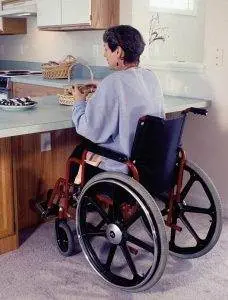
Huntington’s disease is a rare genetic disorder that causes progressive neurodegenerative disease. A neurological disorder, Huntington’s causes damage to brain cells, which leads to physical symptoms like tremor, cognitive problems, and mental disorders, including feelings of depression.
Signs of Huntington’s disease (HD) can begin to show up at any time after age two, and in some cases, a child may develop juvenile Huntington’s disease. Most often, though, a person does not begin to have symptoms of Huntington’s disease until adulthood, usually when they are in their 30s or 40s. Huntington’s is a progressive disease in which symptoms become increasingly severe over time.
Medical science does not currently have a cure for Huntington’s, nor a treatment that will halt the progression of Huntington’s disease. Patients may receive treatment in the form of medications and physical therapy to help control physical symptoms like shaking hands and involuntary movements. They may also be prescribed psychiatric medications to try to help with depression and anxiety.
Acupuncture and TCM can be an effective adjunct and alternative treatment for Huntington’s disease, helping to protect and stimulate the nervous system. TCM can also help address mental health and emotional disorders, like depression, anxiety, and mood swings.
Huntington’s Disease Symptoms
People with Huntington’s disease may start off having a variety of mild symptoms. Over time, the symptoms may change, with some coming or going, and some getting worse. Signs of Huntington’s disease can be related to involuntary movements of the body, cognitive decline that affects a person’s thinking processes, and psychiatric disorders that cause emotional upset. Some of the most common symptoms of Huntington’s disease include:
- Uncontrollable movements: involuntary jerking of the limbs, or writhing, also known as chorea
- Stiff limbs, muscle stiffness, neck stiffness
- Tremor, shaky hands, difficulty holding things
- Slow or unusual eye movements
- Problems with balance or walking
- Difficulty swallowing
- Speech problems, slurred speech
- Having a hard time focusing on a a task
- Having a hard time finding the right words or processing information
- Getting completely caught up with a task or thought pattern
- Impulsive behavior or emotional outbursts
- Lack of awareness of how one is behaving or one’s own changing abilities
- Feelings of apathy, sadness, depression, suicidal ideation
- Manic behaviors or OCD (obsessive-compulsive disorder)
- Trouble sleeping, insomnia
- Extreme fatigue
- Weight loss
Symptoms of Huntington’s disease worsen gradually over time, until ultimately, a person will need assistance to move and eat.
What Are the 5 Stages of Huntington’s Disease?
Huntington’s is a progressive disorder of the brain that causes symptoms to increase in severity over the course of several years. The progression from experiencing mild symptoms to needing assistance due to disability could take 10 years, or a person might live another 30 years.
Sometimes you will hear doctors refer to 3 stages of Huntington’s Disease, or the following 5 stages:
- Preclinical Stage – during this time, a person with Huntington’s may begin to notice mood swings, irritability, and other emotional and cognitive issues beginning to develop, but they have not yet been diagnosed with Huntington’s.
- Early Stage – as physical symptoms like tremors and trouble with eating and sleeping begin to become more and more noticeable, a person will seek medical help and be diagnosed. At this point, they can still carry on with most normal activities without help.
- Middle Stage – during the middle stages of Huntington’s a person will begin to need assistance with things like driving and domestic tasks, as they may not be able to coordinate movements reliably or think through problems or take in new information.
- Late Stage – as Hungtington’s disease progresses further, a person may have memory loss, dementia, and changes in personality. They will likely be bedridden and need help with eating, possibly requiring a feeding tube because of trouble swallowing.
- End of Life Stage – there comes a point when a person with Huntington’s will need end of life care, either in a hospital or at home, when they will need to be as comfortable as possible. The most common cause of death with Huntington’s is pneumonia, which can happen when a person aspirates food particles into the lungs.
How is Huntington’s Disease Inherited?

Huntington’s disease is a type of autosomal dominant disorder, which means that a person only needs to inherit one dominant gene from one parent in order to inherit this disorder. If a person has HD, there is a 50% chance that they will pass it on to a child. If a child of a person with HD does not inherit the gene, and therefore does not have HD, then that means they will not pass it on to their children. It is rare, but possible, for a person to be born with a new mutation in the specific gene, and so does not actually inherit HD from a parent.
Because HD typically does not begin to show up until close to middle age, some people who know that they may have the genetic mutation will have genetic testing for Huntington’s disease. This test will tell most people whether or not they will begin to develop Huntington’s symptoms as they age. However, there is a “gray area,” in which a person may have some of the mutated sequencing in their genetic makeup, but not enough to necessarily lead to the development of the disease. These people can still pass on the mutation to their children, and they may have a less severe form of Huntington’s, and/or not develop symptoms until later in life.
Can Acupuncture Help Huntington’s Disease?
Scientific research has been demonstrating more and more that acupuncture can help with many conditions by maintaining the health and connectivity of brain cells and nerve cells. Cells are constantly going through processes of generation and degeneration. The stimulation of certain acupoints has been shown to have a positive effect on these processes, which can be beneficial for people with neurological disorders like HD and Parkinson’s.
Even though we know that Huntington’s and Parkinson’s are specifically related to protein production, we also know that disease is not merely about one small, isolated thing happening in the body. We must take the whole person into account. Stress and many other factors also play a role in how a disease affects each individual. Acupuncture can be a helpful modality that reduces stress in the body and facilitates regeneration and protection of cells.
With TCM, we are able to address the physical, mental, and emotional aspects of Huntington’s disease all at the same time.
Chinese herbs have traditionally been used to help symptoms such as tremors, stiff limbs, muscle weakness, and slow movements. While from the medical point of view these problems are related to the nervous system, in TCM theory we also see them as being related to deficiencies in the kidney Qi, and excess wind. Therefore, herbs that help strengthen the Kidneys and dispel wind may be used in different combinations to treat conditions like Huntington’s disease.
Acupuncture treatment has been shown to help reduce tremors and shaky hands. One study showed that Chinese herbal preparations were effective at helping to reduce involuntary movements. Another study showed that herbs helped with the normal production of proteins and brain cell function.
Neurological Treatment With Acupuncture

Acupuncture and TCM can help with many different kinds of neurodegenerative disorders, whether they are caused by genetics, autoimmune disease, or some other neurological problem.
Neurodegenerative diseases cause the degeneration and death of neurons, or brain cells that communicate with the nervous system. In that sense, Huntington’s disease bears some similarities to other neurodegenerative diseases like:
- Parkinson’s disease
- Alzheimer’s disease
- ALS (Lou Gehrig’s disease)
- Spinal muscular atrophy
- Essential Tremor
- Multiple Sclerosis (MS)
- Bell’s Palsy
- Guillain-Barre syndrome
Many of these conditions can be helped with acupuncture, which is known to help improve the health of the brain, nerves, spinal cord, and the electrical impulses that create connectivity and functionality in the movements of the musculoskeletal system. TCM modalities can also help to relieve stress, improve sleep, boost cognitive function, and regulate mood swings.
Acupuncture Near Me for Huntington’s Disease, Los Angeles Area
Huntington’s disease is a progressive illness, and it becomes harder and harder for a person with HD to communicate what they are feeling. People with Huntington’s may experience both physical and emotional pain. Patients with Huntington’s need a caring team of healthcare providers who can help treat the disease, but also help their emotional and mental health.
At Art of Wellness, we have over 30 years of experience helping people with neurodegenerative disorders feel more comfortable and live the fullest life possible.
*This article is for education from the perspective of Traditional Chinese Medicine only. The education provided by this article is not approved by FDA to diagnose, prevent, treat and cure human diseases. It should not stop you from consulting with your physician for your medical conditions. Traditional Chinese Medicine is based on Qi, which is an invisible force that usually cannot be observed by modern science. Because science focuses on testing ideas about the natural world with evidence obtained through observation, these aspects of acupuncture can’t be studied by science. Therefore acupuncture and Chinese herbs are often not supported by double-blind, randomized trials, and they are considered alternative medicine therapies in the United States.
How to Treat Meningitis With Acupuncture and TCM
By Qineng Tan, L.Ac., Ph.D. & Xiaomei Cai, L.Ac., Ph.D.
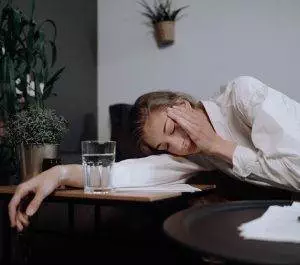
Fever, vomiting, stiff neck, skin rash, aversion to light, bad headache? These are possible early signs of meningitis. Bacterial meningitis can become very serious very quickly—and even be deadly—,so it is important to be aware of meningitis symptoms. Acupuncture and TCM can provide adjunct treatment for meningitis in addition to conventional medicine.
Meningitis is a general term for any kind of swelling or inflammation in the tissue that surrounds the brain and spinal cord. These membranes are called the meninges. Sometimes called “spinal meningitis,” this type of inflammation is most often caused by either a bacterial infection or viral infection, but other things can cause meningitis, too.
The bacteria and viruses that can cause meningitis can be spread from person to person in the same ways as most colds, flus, and other infections. If you suspect you may have bacterial meningitis, it is important to seek treatment right away. Similar to encephalitis (inflammation of the brain), this illness can progress quickly, sometimes causing seizures and even death.
Even after meningitis moves past an acute phase, many people will suffer from after effects and complications of meningitis, like headaches, vision or hearing problems, or cognitive issues. TCM and acupuncture can help people recover more fully from the effects of brain swelling due to meningitis.
Top 5 Types of Meningitis:
Swelling in brain can be caused by meningitis bacteria, or can manifest due to a virus or some other condition. Causes of meningitis can include:
- Bacterial meningitis – meningitis can be triggered by various bacteria, such as the kinds that cause strep throat, pneumonia, tuberculosis, and colds and flu. This type of meningitis can become serious, even causing death if left untreated. Symptoms usually appear quite suddenly, and can worsen in a matter of hours.
- Viral meningitis – Viruses that can cause meningitis include non-polio enteroviruses, herpes virus, West Nile, Epstein-Barr, measles, mumps, and chickenpox/shingles viruses. Typically meningitis caused by these types of viral infection is milder than bacterial meningitis. Certain types of meningitis are also associated with HIV/AIDS.
- Certain types of cancer – if a cancer tumor, such as a brain tumor, or a breast cancer tumor, begin to break apart and move through the body, they can get into the meninges and cause carcinomatous meningitis.
- Lupus – sometimes meningitis can be part of an autoimmune response that affects the central nervous system, such as occurs with Lupus.
- Injury to the head or spine, brain surgery – swelling around the brain can be caused by some kind of external physical trauma
Meningitis can also be caused by a fungus or parasite that gets into the body.
The effects of meningitis, especially bacterial meningitis, can be very serious, so if you see a combination of symptoms from those listed below, you should seek urgent medical attention.
Top 10 Meningitis Symptoms:
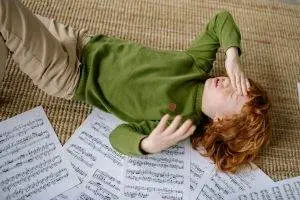
Brain swelling symptoms or symptoms for meningitis can include:
- Fever
- Nausea and/or vomiting
- Stiff neck, neck stiffness
- Severe headache
- Meningitis rash on any part of the body: small red spots, red blotches, blood blisters
- Aversion to bright light
- Fatigue, sleepy, hard to stay awake
- Confusion, delirious, foggy head, difficulty concentrating
- Seizures
- No appetite or thirst
In infants and young children, signs of meningitis might include: crying, not wanting to eat, hard to wake up, high fever, stiffness in the body, swelling or bulging on the top of the head (fontanel).
There are a few types of meningitis vaccine, or meningococcal vaccine, which can help to prevent bacterial meningitis.
Diagnosis and Treatment for Meningitis
When a patient presents with these types of symptoms, a doctor will probably want to err on the side of caution and test for bacterial meningitis, since time is of the essence when treating what could be a very serious condition.

Blood tests, CT scan, or MRI may all be used to check for signs, but a spinal tap to collect cerebrospinal fluid is considered the definitive way to confirm a diagnosis of bacterial meningitis.
Bacterial meningitis is treated with antibiotics and corticosteroid medications to get rid of the bacterial infection and reduce swelling.
Viral meningitis will not respond to antibiotics. Some doctors may prescribe steroid medications to reduce swelling.
It can take longer to figure out what is causing swelling in the brain if it is caused by some other factor, such as a fungal infection, or in relation to an autoimmune disorder. In some cases, a doctor may choose to start treating with antibiotics and/or antivirals until the root cause is determined.
Even after meningitis treatment, some people will continue to have after effects, some of which can even lead to disability. Cognitive problems with memory and concentration, vision problems, headaches, tinnitus (ringing in the ears), dizziness, problems with balance and coordination, and even seizures, can be some of the long-term effects of meningitis. Acupuncture and TCM can be very helpful for treating these lingering symptoms of meningitis.
Can Acupuncture Help Meningitis?
In Traditional Chinese medicine, we classify many infectious diseases—including cold and flu, strep throat, chicken pox, SARS, tuberculosis, and meningitis—as “warm” diseases. When these types of external pathogens get into the body, they cause fever, which depletes the Yin (cool, liquid) energy of the body. The TCM approach, then, is primarily to clear the heat.
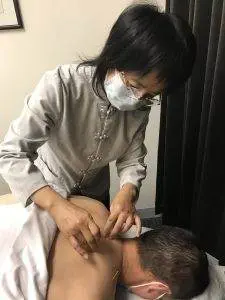
TCM has its own way of looking at symptoms occurring in a pattern, from which we deduce what kind of pathogenic forces are creating disharmony. The TCM view of meningitis is that it relates to an invasion of Heat that leads to a deficiency of Yin energy. A pattern of symptoms that includes: fever, red skin rash, irritability, confusion, and trouble sleeping would indicate that pathogenic heat is depleting the body of fluids and affecting the pericardium, which in TCM means “protector of the heart.”
When these symptoms are present, we know that there is inflammation causing swelling of tissues and preventing the smooth flow of nutrition and Qi to the vital organs. Chinese herbs and acupuncture can help reduce inflammation that causes symptoms of meningitis.
Chinese herbal formulations that go back centuries can also have antibacterial and antiviral effects.
Acupuncture treatment can not only help, then, the root cause of meningitis, but can also deal with the symptoms many people experience as a result of swelling in the brain, such as headaches, dizziness, and spasms.
Acupuncture Near Me for Meningitis – Los Angeles Area
Meningitis is a condition that needs urgent care because it can be a very serious illness in the short-term. Meningitis can also lead to long-term effects that are debilitating. Acupuncture and TCM can provide relief and recovery from meningitis symptoms.
*This article is for education from the perspective of Traditional Chinese Medicine only. The education provided by this article is not approved by FDA to diagnose, prevent, treat and cure human diseases. It should not stop you from consulting with your physician for your medical conditions. Traditional Chinese Medicine is based on Qi, which is an invisible force that usually cannot be observed by modern science. Because science focuses on testing ideas about the natural world with evidence obtained through observation, these aspects of acupuncture can’t be studied by science. Therefore acupuncture and Chinese herbs are often not supported by double-blind, randomized trials, and they are considered alternative medicine therapies in the United States.
How to Treat a Sore Throat With Acupuncture and TCM
By Qineng Tan, L.Ac., Ph.D. & Xiaomei Cai, L.Ac., Ph.D.

Scratchy throat? Dry throat? Painful Swallowing? A sore throat is often the first sign of a cold, but it can be hard to tell if a swollen throat is caused by a throat infection, a virus, bacterial infections like strep throat, allergies, or something else. Acupuncture and TCM Chinese herbs can provide excellent sore throat remedies to bring quick pain relief.
Throat pain, throat irritation, or trouble swallowing due to soreness is known as “pharyngitis.” The most common sore throat causes are viral infections, or cold and flu. This type of sore throat will usually go away once the infection runs its course.
The bacterial infection known commonly as “strep throat,” caused by streptococcus bacteria (throat strep), is another common cause of sore throat, usually accompanied by fever, swollen tonsils and lymph nodes, and red spots in the mouth.
But there are many possible causes of a sore throat, including:
- Common Cold – along with a runny nose, sneezing, and cough, a sore throat is one of the common cold symptoms.
- Flu – a sore throat with fever and chills or body aches may be a sign of flu.
- COVID-19 virus – many people are experiencing a sore throat as one of the early symptoms of the latest variant. This scratchy throat can last a long time.
- Mononucleosis – the Epstein Barr virus, also known as “mono,” can cause a sore throat, swollen lymph nodes, fatigue, and sometimes a skin rash.
- Chickenpox or measles – these illnesses often start off with a mild fever and sore throat; then, the rash or skin sores appear a few days later.
- Allergies – an allergy to pollen or other particles in the air may cause dryness in the throat. Postnasal drip can also create more irritation from constant throat-clearing.
- Dryness – when the weather is very dry—as it is here in California, sometimes—a stuffy nose during the night can lead to sleeping with your mouth open. Breathing dry air through your mouth can cause you to wake up with a sore, scratchy throat.
- Vocal strain – shouting and screaming at a concert, or overusing your voice with talking or singing can lead to throat pain and the need for vocal rest.
- GERD – Acid reflux can damage the tissues of the throat, causing difficulty swallowing, a hoarse-sounding voice, and chronic pharyngitis.
- Sleep Apnea – snoring can cause a dry mouth and sore throat.
Sore Throat Treatment
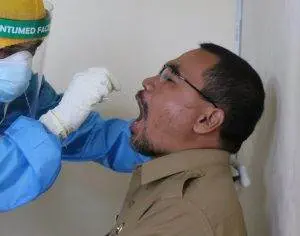
A doctor will typically perform a swab test or throat culture to check if a person has strep throat or a staph infection. If so, antibiotics are usually prescribed to treat the bacterial infection. But antibiotics will not help a sore throat that is due to a viral infection. Most people will take pain relievers or sore throat medicine to help relieve throat pain, or suck on throat lozenges.
People who suffer from burning chest pain and sore throat from GERD will often use over-the-counter antacid tablets to help with scratchy throat.
Most people just wait out a sore throat, hoping it will get better within a few days and not turn into chronic pharyngitis. Acupuncture and other TCM treatments can help reduce the time it takes to get over a sore throat and related illness.
Can Acupuncture Help a Sore Throat?

TCM methods have been used to treat upper respiratory infections, or the common cold, for thousands of years. According to TCM theory, “heat” is a pathogenic force that encompasses conditions of too much heat and dryness in the body. This excess heat can come from both external factors and internal factors. There may be a yin deficiency, meaning that there is not enough yin energy to cool down the body.
People are more prone to developing heat imbalances during the winter months because they tend to spend more time indoors with the heat on, eat more warm foods, and get less exercise. Too much heat builds up in the body, and this leads to inflammation, dryness, and sometimes itchy skin and rashes.
Acupuncture treatment can help reduce inflammation and provide analgesic pain relief of a sore throat. One study showed that people treated with auricular acupuncture for sore throat reported less pain, both 15 minutes after treatment, and six hours later. Acupuncture can also work to help clear heat from the organ systems of the body, clear phlegm from the lungs and upper respiratory tract, and to strengthen the Wei Qi, or defensive Qi.
Chinese herbs will also be instrumental in helping to clear up a sore throat. There are many varieties of herbal formulae that work in different synergistic ways to alleviate a sore throat, depending on the other related symptoms and whether or not there is some type of infection present. An acupuncture practitioner will be able to customize a formula for each individual patient, but there are many tried-and-true Chinese herb preparations that work well for colds and sore throats in many cases.
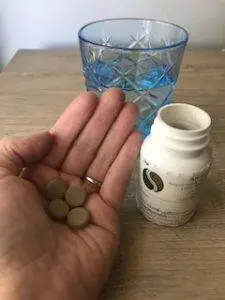
Yin-Qiao, an herbal formulation composed of several Chinese herbs, is a very popular remedy for the common cold and works very well to shorten the duration of a cold, especially if taken right at the first sign of a sore throat. Yin-Qiao has been shown to work on many levels, as an antiviral, anti-bacterial, and an anti-inflammatory, as well as helping to strengthen immunity.
A sore throat is a sign that you should rest your voice, get extra sleep, and consume plenty of liquids. We recommend sipping on warm water, on its own or with lemon or ginger, or an herbal tea such as mint. Eat more cooling foods, such as: apples, pears, especially Asian pears, radishes, cucumbers. These will help dispel heat.
Acupuncture for Sore Throat Near Me in West Los Angeles
While often a sore throat is simply a symptom of a mild cold, it is also a clear signal that there is some kind of infection or other imbalance present. It is wise to pay attention and do everything you can to boost your immune system as soon as you notice that scratchy throat sensation. An acupuncture treatment and herbs can go a long way towards helping make sure that a sore throat doesn’t turn into something more serious.
*This article is for education from the perspective of Traditional Chinese Medicine only. The education provided by this article is not approved by FDA to diagnose, prevent, treat and cure human diseases. It should not stop you from consulting with your physician for your medical conditions. Traditional Chinese Medicine is based on Qi, which is an invisible force that usually cannot be observed by modern science. Because science focuses on testing ideas about the natural world with evidence obtained through observation, these aspects of acupuncture can’t be studied by science. Therefore acupuncture and Chinese herbs are often not supported by double-blind, randomized trials, and they are considered alternative medicine therapies in the United States.
How to Treat Pneumonia Symptoms With Acupuncture and TCM
By Xiaomei Cai, L.Ac., Ph.D. & Qineng Tan, L.Ac., Ph.D.
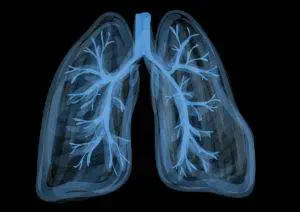
Persistent cough with green or yellow mucus? Chest pain when you cough? High fever, sweating, trouble breathing? It’s important to know the signs of pneumonia, a serious lung infection that can be caused by bacterial infections or viruses like the flu, COVID-19, or even the common cold. You should seek medical help if you believe you have pneumonia; acupuncture and herbs can be considered as integrative care to help relieve symptoms of pneumonia.
The term pneumonia refers to an infection in the lungs that causes inflammation in the alveoli, or air sacs. These air sacs are clustered like fruits around the ends of the branches of the bronchial tubes that extend deep into the lungs. The alveoli inflate and deflate like tiny balloons. They are responsible for taking the oxygen from the air you inhale and depositing it into the bloodstream. When they become inflamed and filled with fluid due to infection, it is hard to breathe. If pneumonia infection is so severe that your body is not getting enough oxygen, then it can become quite dangerous.
Pneumonia can be caused by a variety of infectious bacteria or viruses, and often develops after, or in the tail end, of some other type of illness. A pneumonia infection can range in seriousness from mild to very severe. Bacterial pneumonia requires treatment, especially for people who are considered high risk, or it can be potentially life-threatening. Acupuncture and TCM offer an effective adjunct to conventional pneumonia treatment, allowing people to recover more quickly and fully.
Early Signs of Pneumonia
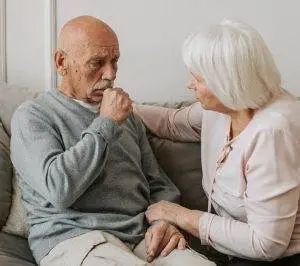
In many cases, you start out having a cold, flu, or some other illness, and then it “turns into” pneumonia, as your lungs become inflamed and filled with pus or mucus. Symptoms of pneumonia include:
- Cough with green or yellow mucus
- High fever
- Sweating
- Trouble breathing, breathing fast
- Fatigue
- Fast heart beat
- Chest pain, especially when coughing
- Feeling confused or delirious
- Lips and/or nails turn blue
- Loss of appetite
Signs of pneumonia in children may be different that symptoms of pneumonia in adults. There may be coughing, wheezing and high fever, but there may also be vomiting and/or diarrhea, especially if the infection is in the lower part of the lungs. Children are at risk for becoming dehydrated under these circumstances.
Walking pneumonia symptoms are generally milder than other types of pneumonia, similar to symptoms of the common cold, like a low grade fever and hacking cough. A person may not feel so seriously ill that they can’t go about normal activities: hence the name “walking pneumonia.”
Pneumonia can affect just one one lung, or both. When both lungs are infected, it is called bilateral pneumonia, or double pneumonia. This does not necessarily mean the case is more severe.
Is Pneumonia Contagious?
Some types of pneumonia are caused by exposure to bacteria or viral particles in the air or on surfaces. Germs that cause colds and flu can lead to some people developing pneumonia, while other people could be exposed to those same germs and not get pneumonia. It really depends on a person’s constitutional health and immune system.
Other kinds, like fungal pneumonia or aspiration pneumonia, are not caught through contagion. They develop because of some substance, other than germs, getting into the lungs.
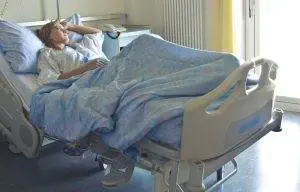
Some types of bacterial pneumonia would not be passed from person to person in normal day-to-day contact, but they may occur when a person is in a weakened state and/or an institutional setting. For example, klebsiella pneumoniae is a type of bacteria that normally lives in the intestines and doesn’t cause illness. However, in a hospital, it is possible to be exposed to this type of bacteria via a worker’s hands or contaminated equipment, such as a catheter or ventilator. If this bacteria then reaches the lungs, it can cause pneumonia symptoms.
Many people “catch” pneumonia when they are in a hospital or rehab setting. Sometimes, people develop pneumonia after being on a ventilator as treatment for some other illness or while recovering from surgery. When this happens, it is called hospital-acquired pneumonia, or health care-acquired pneumonia.
Top 5 Pneumonia Causes
Pneumonia can be caused by various types of infections: bacterial, viral, or fungal.
- Bacterial Pneumonia – also called pneumococcal pneumonia, or streptococcus pneumonia, this is the most common type of pneumonia, and is caused by strep germs that cause upper respiratory illnesses. Almost a million Americans get this kind of pneumonia every year. It can happen at the tail-end of a cold or flu, or after having surgery or being hospitalized for some other reason. People with respiratory problems like asthma or emphysema are at higher risk, as are people who are immunocompromised.
- Viral Pneumonia – this is caused by an influenza virus or respiratory syncytial virus (RSV). This is the type that children may get more often. If a person who already has heart disease or lung disease, or someone who is pregnant, develops pneumonia after a flu, it can be very dangerous.
- Mycoplasma Pneumoniae (Walking Pneumonia) – this type of pneumonia is caused by a bacterial strain. This usually affects younger people who are living, working, or going to school, and is often mild enough that people think they just have a cold. This is sometimes called “atypical pneumonia,” but that doesn’t mean it isn’t common.
- Fungal Pneumonia – it is possible to get this kind of pneumonia if you are exposed to certain fungi in the environment, like those that live in soil and cause “valley fever,” or fungi that are found in bird droppings.
- Legionnaires Disease – legionella is a bacteria that can live in water or soil, and is sometimes present in plumbing, air conditioning systems, pools, or jacuzzis. People can sometimes breathe it in while gardening. If an at-risk individual breathes in this bacteria, they may develop a kind of pneumonia that also causes body aches. In some cases, people may go into septic shock or kidney failure.
People who have weakened immunity due to conditions like HIV/AIDS, or because they are going through chemotherapy for cancer, are at heightened risk for developing pneumonia, as are people who have trouble swallowing due to neurological conditions like stroke, Alzheimer’s disease/dementia, Parkinson’s disease, or ALS.
Smoking or using other drugs can also increase the risk of aspiration pneumonia, which can occur if a person breathes something–such as saliva, vomit, or food particles–into their bronchial tubes instead of swallowing it.
People with pre-existing lung conditions like emphysema/COPD or Cystic Fibrosis (CF), or other chronic illnesses, like diabetes, are also at higher risk for getting a serious case of pneumonia.
Medical Pneumonia Treatment
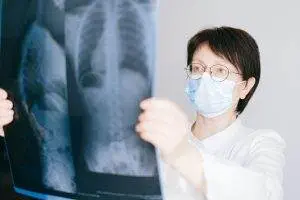
It is important to seek treatment if you believe you have pneumonia, because it can become very serious very quickly. First, doctors will do testing to determine what is causing the pneumonia. They will probably perform an x-ray to see where the lungs are inflamed.
Bacterial forms of pneumonia are typically treated with antibiotics, usually some form of amoxicillin. Pneumonia antibiotics cannot help if you have viral pneumonia, although some doctors may recommend medicines like Tamiflu, to help with symptoms.
Recovering from pneumonia takes time, no matter what kind of medication you take. It is normal to feel very tired, possibly for up to a month, or more. Rest, and drink lots of liquids, reduce your workload, and accept help whenever possible.
Acupuncture treatment and Chinese herb preparations can be very helpful for helping facilitate a more comfortable recovery from pneumonia.
Can Acupuncture Help Pneumonia?
According to TCM theory of disease, pneumonia is considered an invasion of the lungs by dampness and heat that leads to the production of phlegm. Wind and heat cause the fever and chills and sweating associated with the pneumonia.
TCM treatment for pneumonia can help on multiple levels: first, by addressing the infection in the lungs, second, by alleviating respiratory and gastrointestinal symptoms, and third, by helping to offset any negative side effects of conventional medical treatments.
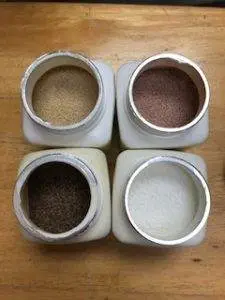
Chinese herbal formulations can help to clear heat and congestion from the lungs, reduce fever, and relieve coughing. One study observed two groups of pneumonia patients: both groups were given conventional antibiotics, but one group also received acupuncture herbs, which increased the total effectiveness rate by 10%.
Acupuncture was found to help patients who were hospitalized with severe pneumonia, reducing the amount of time they needed to be on ventilator machines and improving their symptoms.
Another study of children being treated in the hospital for pneumonia found that those who had acupuncture treatment had shorter hospital stays and needed less medication.
TCM works effectively as preventive medicine, so coming in for a regular “acupuncture tune-up” can help you avoid the seasonal colds and flus that can turn into pneumonia. It can also help immunocompromised people and those at higher risk of aspiration pneumonia due to neurological conditions avoid becoming ill.
Acupuncture Near Me for Pneumonia
If you are experiencing fever, chest pain when coughing, extreme fatigue, sweating, and/or looking blue around the lips, do not hesitate to get medical attention. Pneumonia requires urgent care. Once diagnostics have determined whether you have bacterial pneumonia or some other type, then it can be beneficial for you to add integrative care in the form of acupuncture and herbs to your recovery program. TCM methods can help clear phlegm from your lungs and help you regain your strength.
*This article is for education from the perspective of Traditional Chinese Medicine only. The education provided by this article is not approved by FDA to diagnose, prevent, treat and cure human diseases. It should not stop you from consulting with your physician for your medical conditions. Traditional Chinese Medicine is based on Qi, which is an invisible force that usually cannot be observed by modern science. Because science focuses on testing ideas about the natural world with evidence obtained through observation, these aspects of acupuncture can’t be studied by science. Therefore acupuncture and Chinese herbs are often not supported by double-blind, randomized trials, and they are considered alternative medicine therapies in the United States.
How to Treat the Common Cold With Acupuncture and TCM
By Qineng Tan, L.Ac., Ph.D & Xiaomei Cai, L.Ac., Ph.D.
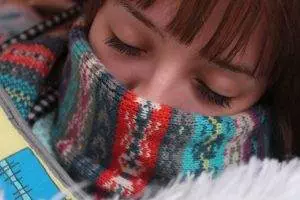
Sneezing, runny nose, nasal congestion, cough? How can you tell if it’s a cold symptom, a flu, COVID-19, mononucleosis, croup, or maybe an allergy? All of these illnesses can cause fatigue and a stuffy nose. The common cold, however, does not cause a high fever, and the cough is usually mild, not a persistent cough. Acupuncture and TCM herbs offer a highly effective way to relieve common cold symptoms.
A cold is a kind of viral infection that affects your upper respiratory tract, centering mostly in the nose and throat. Different viruses can cause the common cold; rhinovirus is the most common kind of cold virus.
You can catch a cold virus when you are near someone else who sneezes or coughs, and you get droplets containing the virus into your own nose, mouth, or eyes, or you touch something they coughed or sneezed on, and then touch your own face.
Young children and people with weakened immune systems are more prone to catching colds, as are people who smoke. You’re more likely to catch a cold if you spend a lot of time in crowded places, like schools, airports, public transportation, etc. More people get colds during the winter, because more people are packed together indoors, but cold-causing viruses are circulating all through the year.
You will start feeling cold symptoms within a few days of being exposed to the virus. Typically, without any medical intervention, a cold will last about a week or ten days. For some people, though, a cold can lead to other, more serious infections, like an ear infection, asthma and wheezing, sinusitis/sinus infection, bronchitis, or even pneumonia.
Cold symptoms aren’t so much caused by the virus, but by the workings of the body’s own immune system to expel the virus. Coughing and a runny nose are the body’s way of getting the virus out of the respiratory system. While the common cold doesn’t necessarily require any medical treatment, it is best to take steps to strengthen your immune system and clear the virus as soon as you can.
Chinese herbs and acupuncture treatment are an excellent way to shorten the duration and lessen the severity of a cold. Regular acupuncture treatment also functions as preventive medicine, so that you and your family don’t catch cold nearly as often.
Top 10 Common Cold Symptoms
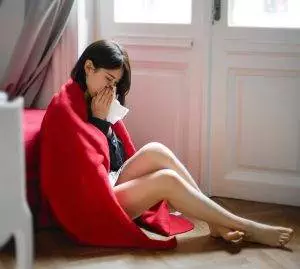
How can you tell if you have a cold or a flu? Usually, cold symptoms are more centered in the nose and throat, and are milder than flu symptoms. A flu is more likely to cause serious fatigue, chills and fever, and body aches than a cold is.
The typical symptoms of common cold include:
- Runny nose, stuffy nose, nasal congestion
- Sneezing
- Sore throat
- Cough
- Post-nasal drip
- Watery eyes
- Headache
- Body aches
- Low grade fever
- Fatigue, feeling tired
Sometimes people differentiate between head cold symptoms and a chest cold. A head cold describes the way most rhinovirus colds manifest in the upper respiratory organs: with a stuffed up nose, sniffling, headaches, and a red, sore throat.
If the cold “moves” down into the chest, causing inflamed bronchial tubes, and mucus production in the lungs, this is called acute bronchitis. This feels more like chest congestion, with a more persistent cough. Once a cold turns into bronchitis, you are more likely to have a serious cough, with or without coughing up phlegm.
How Is the Common Cold Usually Treated?
The accepted wisdom is that there is no cure for a cold; you just have to do whatever you can to make yourself more comfortable while the illness runs its course. Antibiotics only help get rid of bacterial infections. They do not help when you have a viral infection.
While it is true that there is no medication you can take to get rid of a cold, there are many remedies, both traditional home remedies for cough, and popular over-the-counter medicines and health store supplements that claim to take care of your cold symptoms.

Many people swear by things like Vitamin C, Zinc lozenges, or echinacea preparations. Other people will tell you to drink hot honey water and eat chicken soup. All of these natural cold remedies may have some benefits. At least, they don’t do any harm.
Other cold medicines may do more harm than good. Cough suppressants and nasal decongestants actually work against your body’s natural defenses. Your body is producing mucus and the cough reflex in order to expel the virus and keep it out of your lungs. Repressing these natural immune responses can prolong your cold.
Nasal decongestants like Sudafed can cause a fast heart rate and jittery feelings, especially in young children. Cough syrup with antitussive properties, or cough suppressant, can have negative side effects besides just making you drowsy or irritable. Some cough medicines can interact with other medications, making them inappropriate for people who have problems like high blood pressure, enlarged prostate (BPH), or glaucoma.
Trying to power on through your days with the help of OTC cold relief medications, caffeinated drinks, and sugary cough drops, without getting the rest you need, is not a good idea. Getting extra rest and drinking plenty of fluids are definitely tried and true ways to get over your cold.
Consider that acupuncture and herbal medicine developed over centuries of TCM tradition can help address cold symptoms without any side effects, and may help you recover more quickly than rest alone.
TCM for Colds: How to Get Rid of a Cold Fast

In TCM we consider some conditions to be external, meaning that they come from outside the body, in the form of pathogenic factors like heat, cold, wind, and dampness. Based on the environment, and the types of symptoms, we determine whether a cold follows a pattern of a cold-wind type, or a heat-wind type, or sometimes a hot-damp type as might occur during the summertime. An acupuncture practitioner will then base the treatment on the pattern of cold presented.
Acupuncture treatment influences the immune system’s response, and since that is what is actually causing the symptoms of a cold, the use of acupuncture points for cold and sore throat can really have a positive effect on reducing cold symptoms.
Cupping is a TCM modality that may be used to help treat colds and other respiratory conditions. Cupping helps to relieve congestion and gets lymph and blood circulation moving.
When you come in with a cold, your TCM provider will tailor your acupuncture treatment and prepare an herb formula specific to your needs. That said, our patients who have been coming into Art of Wellness for many years know that there is a

standard formula that is excellent for “knocking out” a cold if you can catch it at the very beginning. Right when you begin to feel that tickle in the back of your throat, that is the time to reach for your supply of Yin Chiao pills!
Ginger tea, made by simply slicing a bit of fresh ginger and steeping it in hot water, is also a great way to stop a cold in its tracks, before it gets worse.
Acupuncture Near Me for Common Cold in Santa Monica, West LA
Making time for regular acupuncture “tune-up” visits can help keep your body and mind balanced and your immune system in good working order. In the ancient TCM tradition, acupuncturists used to treat their patients for free when they caught a cold type illness, because it meant they hadn’t done their job of boosting immunity well enough. Prevention is certainly the best medicine when it comes to colds and flus. When you do begin to feel the first signs of a cold, though, it isn’t too late. Come in for a treatment, or call us at Art of Wellness to order some herbs to be shipped to you. We can help you get over your cold symptoms quickly.
*This article is for education from the perspective of Traditional Chinese Medicine only. The education provided by this article is not approved by FDA to diagnose, prevent, treat and cure human diseases. It should not stop you from consulting with your physician for your medical conditions. Traditional Chinese Medicine is based on Qi, which is an invisible force that usually cannot be observed by modern science. Because science focuses on testing ideas about the natural world with evidence obtained through observation, these aspects of acupuncture can’t be studied by science. Therefore acupuncture and Chinese herbs are often not supported by double-blind, randomized trials, and they are considered alternative medicine therapies in the United States.